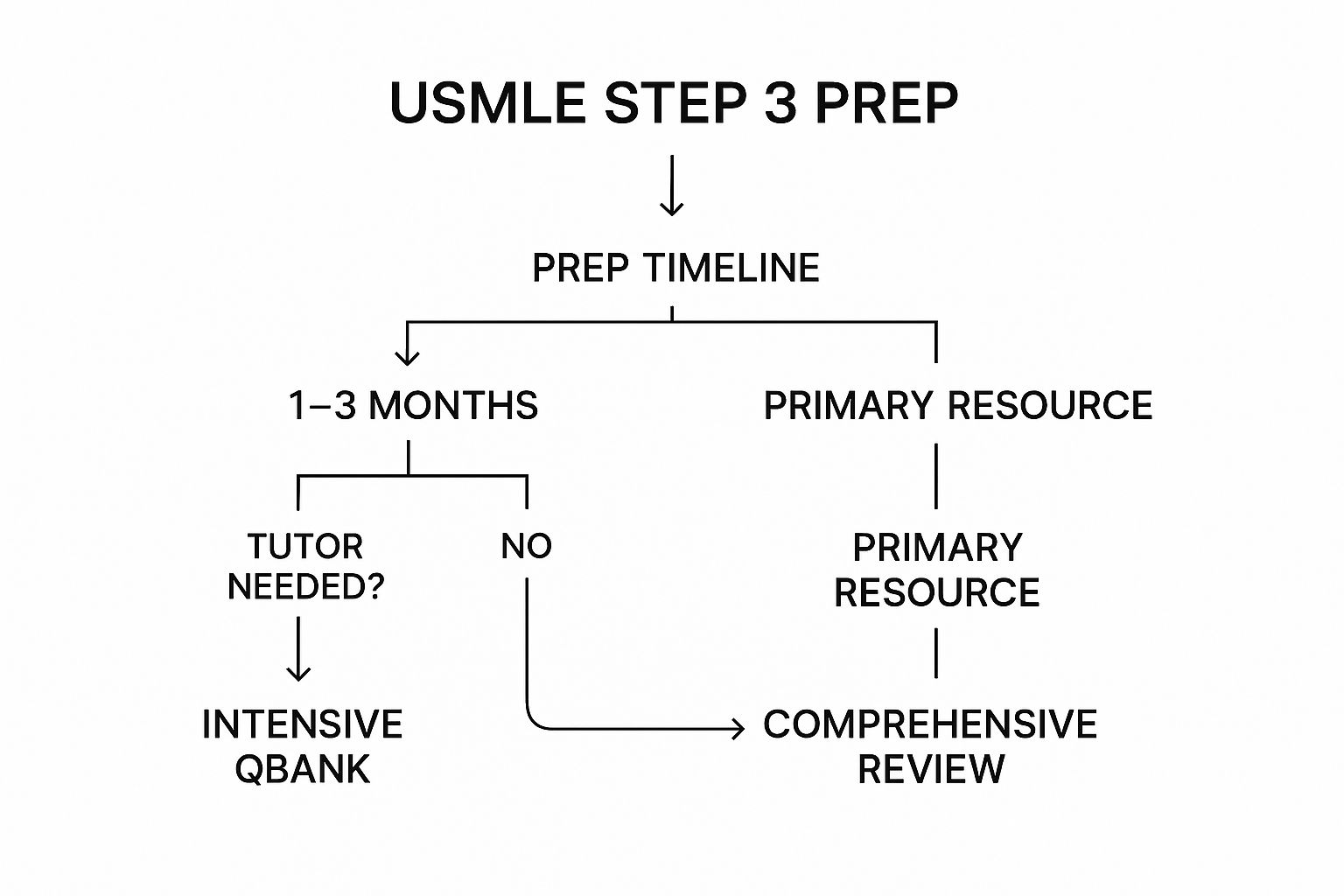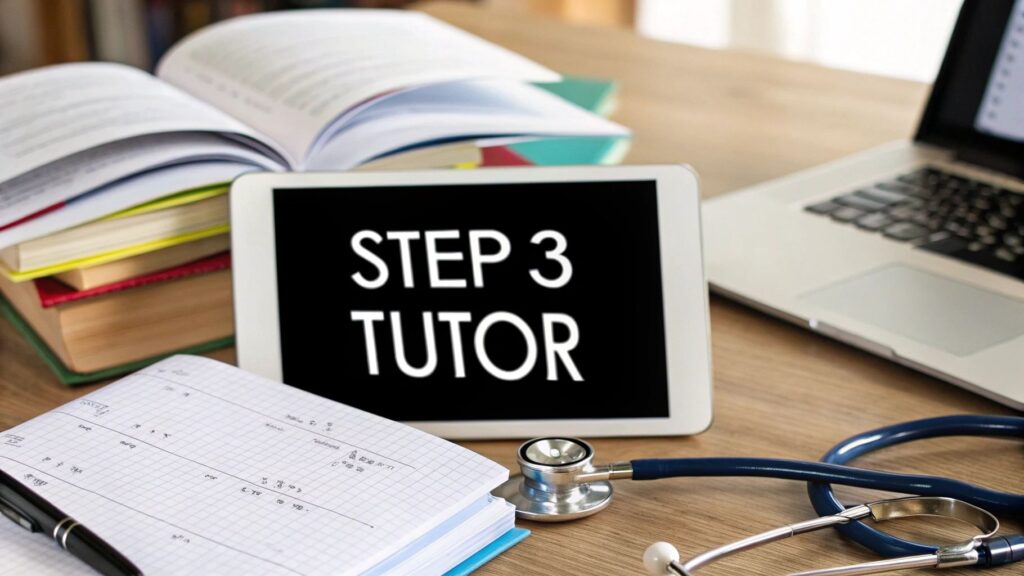Let's be honest. Investing in a USMLE Step 3 tutor can feel like a big decision, especially when you're already juggling residency. But it can be the single most effective move you make, turning a stressful, chaotic solo grind into a focused, efficient, and successful prep experience.
A great tutor's job is to give you personalized strategies for this exam's unique beast—the Computer-based Case Simulations (CCS)—while keeping you on track amidst a grueling residency schedule.
Why a USMLE Step 3 Tutor Is a Smart Investment

It’s a common mistake for residents to think that strong scores on Step 1 and Step 2 CK will automatically carry them through Step 3. I've seen it time and time again. But this final exam is a completely different animal.
Step 3 moves way beyond pure recall. It's designed to test your ability to act like an independent physician, demanding sharp clinical decision-making and patient management skills under intense pressure. Frankly, that’s a skill set that even the most hectic residency shifts don't always tune perfectly for a standardized test.
And let's not forget the reality of juggling 80-hour workweeks with study time. It's brutal. A dedicated USMLE Step 3 tutor steps in to build a structured study plan that actually fits your schedule, making sure you hammer high-yield topics instead of wasting precious hours on less critical material.
Bridging the Knowledge to Application Gap
The absolute core of Step 3 is application, not just memorization. You might know the textbook management for heart failure backward and forward, but can you navigate a complex patient presentation in the clunky CCS software? Can you order the right tests, in the right sequence, all while the clock is ticking down?
This is precisely where a tutor makes the biggest impact. They provide that critical, one-on-one feedback on:
- CCS Case Strategy: A good tutor has seen it all. They'll walk you through simulated cases, point out the common traps and pitfalls, and teach you the specific rhythm and flow the CCS software demands.
- Biostatistics Interpretation: Let's face it, those dense study abstracts and biostats questions are a huge hurdle for many. A tutor can demystify them and turn a point of weakness into a strength.
- Advanced Clinical Medicine: The exam loves to test integrated content. Tutors are experts at helping you connect the dots between different medical disciplines, which is essential for success.
The old saying, "two months for Step 1, two weeks for Step 2, and a Number 2 pencil for Step 3," is dangerously outdated advice. This exam requires focused, strategic preparation, especially with its heavy emphasis on clinical application and the CCS cases.
Navigating the Exam's High Stakes
While it's true that Step 3 pass rates are generally high, the statistics tell a more nuanced story. This exam is a critical checkpoint for safe, independent practice, and the numbers reflect that.
For first-time U.S. and Canadian graduates, the pass rate is a reassuring 97%. But that number takes a sharp dip to around 76-77% for repeat test-takers. International Medical Graduates (IMGs) also face a tougher climb, with a first-time pass rate hovering around 91-92%.
These figures show that while passing is definitely achievable, it's not a guarantee. This makes expert guidance a powerful tool for locking in success on your first attempt. For IMGs or anyone who has struggled on a previous USMLE, a tutor can be the key to overcoming these statistical odds. You can explore more about the 2024 USMLE requirements and what they mean for test-takers today.
Figuring Out Your Ideal Tutor Profile
Finding the right USMLE Step 3 tutor isn't about chasing someone with a stellar three-digit score. It’s about finding a genuine partner for your prep journey. You need someone whose teaching style clicks with your brain and who has a real track record of getting residents across the finish line for this specific exam.
Before you even glance at a tutor's profile, you need to do a little self-assessment. Seriously, take a moment. What are your biggest headaches right now?
- Is it the dreaded Computer-based Case Simulations (CCS) that keep you up at night?
- Maybe it’s those biostatistics questions that make your eyes glaze over.
- Or perhaps the real challenge is just figuring out how to study effectively while juggling an 80-hour workweek.
Your answers to these questions are the building blocks of your ideal tutor profile. Someone who’s a wizard at CCS strategy is perfect if that’s your main weakness. But if you're struggling to break down complex study abstracts, you’ll need a different kind of expert.
This initial self-reflection is the most important step. It’s what stops you from hiring a generic, one-size-fits-all instructor and helps you pinpoint a specialist who can deliver targeted, high-impact help exactly where you need it most.
This graphic really drives home how your study timeline and resources should influence your decision.

The bottom line? If you're on a crunched timeline—especially less than two months—the focused, personalized guidance of a tutor becomes almost essential to stay on track and maximize every study hour.
Key Questions to Ask a Potential Tutor
Once you've got a shortlist, the initial consultation is your time to really dig in. Forget just asking, "What was your score?" Go deeper with questions that reveal their true teaching ability.
Here are a few essential questions I always recommend asking:
- On CCS Strategy: "How do you specifically teach the CCS cases? Can you walk me through your general approach for tackling one?"
- On Teaching Style: "What's your method for making tough topics like biostats or medical ethics feel simple and intuitive?"
- On Adaptability: "How do you build a study plan for a resident with an unpredictable schedule and insane work hours?"
- On Tracking Progress: "What metrics do you use to see if I'm actually improving? How will we know what's working?"
Their answers tell you more than just what they know. They reveal how they communicate and whether they can truly adapt to the chaotic reality of being a resident. For more on building a solid plan, our guide on how to study for USMLE Step 3 has some great insights.
A great tutor won't just tell you what to study. They’ll show you how to think about the material, especially for the nuanced clinical reasoning that Step 3 demands.
Individual Tutor vs. Tutoring Company
One of the final forks in the road is choosing between an independent tutor and a larger tutoring company. Both have their pros and cons, and the best choice really depends on what you value most.
To make it easier, here's a quick breakdown of what you can generally expect from each.
Individual Tutor vs. Tutoring Company
| Factor | Individual Tutor | Tutoring Company |
|---|---|---|
| Personalization | Highly personalized; the plan is built 100% around you. | More structured; may use a standardized curriculum. |
| Flexibility | Often very flexible with scheduling and session length. | Scheduling can be more rigid or based on set time slots. |
| Cost | Varies widely; can be more or less expensive depending on the person. | Often a higher price tag due to overhead and resources. |
| Resources | Limited to the tutor's personal materials and knowledge. | Access to proprietary materials, platforms, and a pool of tutors. |
| Vetting | You are fully responsible for vetting and background checks. | Tutors are pre-vetted, adding a layer of quality control. |
Ultimately, there's no single "best" answer—it all comes down to your personal priorities. If you crave maximum flexibility and a deeply personal one-on-one relationship, an individual tutor is probably your best bet. On the other hand, if you feel more secure with structured support, pre-vetted instructors, and a library of resources, a company might be a better fit.
How to Vet and Select Your Tutor

Alright, you've got a shortlist of potential tutors. Now comes the most important part: moving beyond impressive resumes and high score reports to find someone who can actually be a partner in your success. This is where you roll up your sleeves and see who can genuinely help you improve.
Your main goal here is to test two things: their knowledge and, just as crucially, their communication style. I've seen brilliant physicians who are completely incapable of breaking down complex ideas. That's not a tutor; that's just a smart person talking at you. You need someone who can make the tough concepts click for you, especially when you're short on time.
This means you absolutely must have a trial or sample session. This is non-negotiable. It’s the single best way to gauge teaching effectiveness and personal chemistry before you commit your time and money.
Designing an Effective Trial Session
Don't just show up to a sample session and "see how it goes." You need to come prepared with a specific challenge for the tutor. The point isn't to stump them, but to see their teaching process in action with a real-world problem you're struggling with.
For instance, bring a tricky biostatistics question from UWorld that you got wrong and still don't quite understand. Or, ask them to walk you through the initial management of a CCS case that always trips you up. A targeted approach like this reveals so much more than a generic "let's chat" session.
Here’s what you should be looking for during this test drive:
- Clarity of Explanation: Do they make complicated topics feel simple, or do they just add another layer of confusion?
- Patience and Empathy: How do they respond when you admit you don't get it? Are they encouraging, or do they seem dismissive?
- Problem-Solving Process: This is key. Do they just spoon-feed you the answer, or do they guide you through the clinical reasoning to get there on your own?
A great USMLE Step 3 tutor won’t just tell you what the right answer is. They’ll show you the path to figuring it out for yourself. This is the skill that builds the independent clinical reasoning you need to pass the exam and succeed as a physician.
Red Flags to Watch Out For
Just as you're looking for green lights, you need to be hyper-aware of the red flags. Some warning signs should make you walk away immediately, as they often point to a tutor who is more interested in their system than in your actual success.
Be very skeptical of any tutor who:
- Offers a rigid, one-size-fits-all plan: As a busy resident, your study needs are unique. If a tutor isn't willing to build a plan around your specific schedule and weak points, they aren't the right fit.
- Lacks a clear method for tracking progress: If their plan for measuring improvement is just "we'll do some questions," that's a huge problem. Real tutoring is data-driven, using your performance on practice blocks and CCS cases to guide what you work on.
- Guarantees a specific score: Nobody can ethically guarantee a score. This is a classic high-pressure sales tactic that ignores all the variables that go into exam performance. Run.
- Downplays the CCS cases: The CCS portion of the exam accounts for roughly 25% of your final score. Any tutor who treats it as an afterthought is fundamentally failing to prepare you for the realities of Step 3.
Ultimately, trust your gut. If a tutor’s personality feels off or their promises sound way too good to be true, they probably are. Finding the right person is a huge investment in your career, so take your time and choose wisely.
Maximizing Every Tutoring Session
Landing a top-tier USMLE Step 3 tutor is a huge win, but here's the honest truth: the real score bumps happen based on how you show up. Simply being present isn't enough. To get the most out of this investment, you have to shift your mindset from being a passive student to an active partner in your own prep.
This means treating every single session like a strategic meeting with clear objectives.
Your work starts long before you log into the video call. Showing up cold is the fastest way to burn through your time and money. Instead, block out 30-45 minutes beforehand to get laser-focused on exactly what you need help with. This isn't about re-studying entire chapters; it's about targeted problem-solving.
Go through your recent UWorld blocks. Find those questions you still got wrong even after you read the explanation. Those are pure gold for a tutoring session.
Before Your Session Begins
You need to walk in with a "problem list" for your tutor. This should be a smart mix of specific questions and broader weak spots you've noticed. A killer list looks something like this:
- Specific Questions: "I don't get why thrombolytics were the wrong call in UWorld ID #12345. Can we unpack the contraindications in that specific patient context?"
- Concept Gaps: "I'm consistently tripping up on vaccine schedules for adults, especially when they have chronic conditions like RA or IBD."
- CCS Case Issues: "My biggest issue in practice CCS cases is advancing the clock. I get bogged down ordering things, and my patient deteriorates. Can we do a case where I 'drive' and you guide my timing?"
Coming in with this level of detail changes the whole game. It turns a generic review into a high-yield, personalized workshop. Your tutor can immediately dive into the deep end of your weaknesses instead of wasting the first 15 minutes trying to figure them out.
The most productive tutoring sessions are driven by the student's specific, well-prepared questions. A vague request like, "Let's go over cardiology," is worlds away from the effectiveness of, "Let's review the management of acute coronary syndrome in a patient who also has a history of GI bleeds."
Engaging Actively During the Session
Once the session kicks off, your job is to be an active participant, not a spectator.
If your tutor is breaking down a tough concept, don't just nod along. A really powerful technique is to teach it back to them. After they explain the workup for hyponatremia, you try summarizing it back in your own words. You'll instantly see where the wires are crossed in your own mind.
For CCS cases, ask to "co-pilot." This means you're in the driver's seat—you order the tests, you prescribe the treatments, you counsel the patient—while your tutor gives you real-time feedback. This is so much more valuable than watching them run through a case perfectly. It puts you in the hot seat, simulating the real exam pressure but with an expert safety net.
To get the most out of this, you should also be building your stamina and pattern recognition on your own with a solid bank of USMLE Step 3 practice questions.
Solidifying Your Gains After the Session
The learning doesn't stop when you log off. The 24 hours after your meeting are absolutely critical for making new knowledge stick.
Right after the session, take 15-20 minutes to consolidate your notes. Don't just file them away. Re-write them, organize the key takeaways, and maybe make a few flashcards for those "aha!" moments or tricky facts you finally conquered.
Then, you need to apply what you learned immediately. If you spent the session working on heart failure management, go do a targeted block of 10-15 UWorld cardiology questions on that exact topic. This immediate application is what pushes knowledge from your shaky short-term memory into solid long-term storage.
This cycle—prepare, engage, and apply—is what ensures you squeeze every drop of value from every single minute with your tutor.
Common Pitfalls in Tutor-Led Step 3 Prep
Hiring a top-tier USMLE Step 3 tutor is a smart move, but let's be clear: it's not an automatic pass. I've seen it time and again—even with an expert guide, residents can fall into common traps that completely undermine the process. Knowing what these pitfalls are is the first step to making sure your investment pays off.
One of the biggest mistakes is becoming a passive passenger. It's incredibly easy to slip into a routine where you just listen, nod, and assume you're soaking up the material. But if you aren't actively engaging, firing back with questions, and grinding through the independent work between sessions, your score will flatline. Your tutor is a co-pilot, not a substitute for you flying the plane.
Another classic error? Failing to speak up when a strategy just isn't working for you. Your tutor might have an amazing method for biostats, but if it doesn't click with your brain, it’s useless. Don’t ever be afraid to say, "I'm still not getting this. Can we attack it from a different angle?" A good tutor adapts. A great one will welcome that feedback.
Getting Lost in Low-Yield Details
A huge danger zone is getting bogged down in low-yield minutiae. With a tutor's guidance, your focus should be laser-sharp on high-impact areas. But it’s so tempting to get fixated on that one rare disease or obscure drug side effect you missed on a UWorld question. Part of your tutor's job is to pull you back to the big picture, but you need the discipline to trust their lead and let go of the noise.
This is especially critical when you're juggling a demanding residency schedule. Every minute counts. Squeezing tutoring sessions into an overflowing week without a clear plan is a recipe for exhaustion and poor retention. This is a primary driver of burnout, and you have to recognize the signs before they completely derail your prep. If you're feeling overwhelmed, check out our insights on how to manage USMLE exam burnout.
A scenario I see way too often is a resident who shows up for every session like clockwork but sees zero score improvement. The root cause is almost always passivity—they're waiting for the tutor to pour knowledge into their brain, but they aren't doing the active work of applying it between sessions.
Misinterpreting Your Progress and Goals
You also have to understand what your performance data is telling you. The Step 3 passing score hovers around 196-198, but just aiming for that number is a risky game. The exam's scoring is more nuanced than people realize. For example, a score of 255 correlates with a 97% pass rate, but that drops to just 79% at a score of 240.
An experienced tutor helps you set a realistic target score well above the minimum, creating a comfortable safety net.
Finally, showing up to your sessions unprepared is a costly mistake. If you arrive without specific questions or a list of problem areas, your tutor has to spend your valuable, paid time just figuring out where you need help. Come to every session with a hit list of challenging concepts or specific UWorld questions you struggled with. This simple habit transforms your session from a generic overview into a targeted, high-yield surgical strike on your weaknesses.
Frequently Asked Questions

Deciding to work with a USMLE Step 3 tutor usually brings up a handful of practical questions. Let's tackle the most common concerns residents have, so you can move forward with confidence and make the right call for your career.
How Many Tutoring Hours Do I Really Need?
This is the million-dollar question, and the honest answer is: it completely depends on you. There's no magic number. Your starting point is determined by your self-assessment scores, how you're doing on practice exams like UWorld, and how much time is left on the clock before your test date.
A good tutor won't just guess. During your first meeting, they should do a deep dive into your strengths and weaknesses. From there, they can map out a realistic plan. For someone who just needs to sharpen their skills on biostats or nail down CCS cases, 10-15 hours might be perfect. But for a resident who needs a more thorough review or has struggled with the exam before, a more comprehensive plan of 30+ hours is often a better fit.
Is a Tutor Actually Better Than a Big Review Course?
This really boils down to your learning style and what you need to fix. Think of a big review course like a lecture hall—it offers a structured, one-size-fits-all curriculum that's great for getting a broad overview of the material.
A tutor, on the other hand, provides a completely different experience. It's personalized, one-on-one attention laser-focused on your specific weak spots. They move at your pace and can answer your exact questions on the spot. For most residents, the sweet spot is a hybrid approach: use a question bank like UWorld for your daily grind and bring in a USMLE Step 3 tutor for targeted, high-impact guidance.
Your time as a resident is your most valuable asset. The goal of tutoring isn't just to learn information; it's to learn it efficiently. A tutor's primary value is in creating a personalized, direct path to closing your specific knowledge gaps, saving you countless hours of unfocused study.
Can a Tutor Specifically Help Me with CCS Cases?
Absolutely. In fact, this is one of the single most valuable things a Step 3 tutor does and a huge reason why many residents seek one out. The Computer-based Case Simulations (CCS) are a whole different beast compared to previous USMLE exams. Mastering the software, the timing, and the strategy is a skill in itself.
An experienced tutor is a game-changer here. They can:
- Run you through interactive case simulations in real time.
- Show you exactly when and how to advance the clock.
- Help you spot critical patient cues and sidestep common diagnostic traps.
- Give you immediate, actionable feedback on your clinical decisions.
That direct feedback loop is nearly impossible to create on your own. Given that the CCS portion makes up about 25% of your final score, getting this right is non-negotiable.
What If I Don't Click with My Tutor?
Don't hesitate—make a change. Your time, your money, and your exam score are far too important to stick with a poor match. If you've tried to communicate what's not working and things still feel off, it is completely okay to find someone new.
Any reputable tutor or tutoring service gets it. They know that the right personal and teaching chemistry is vital for success. They'll have professional policies in place to handle these situations, ensuring you can connect with a guide who truly gets your learning style.
Ready to stop guessing and start improving? The expert tutors at Ace Med Boards are dedicated to creating personalized strategies that fit the demanding life of a resident. We specialize in demystifying CCS cases and building a plan that works for you. Schedule a free consultation today and take the first step toward acing your Step 3 exam.

